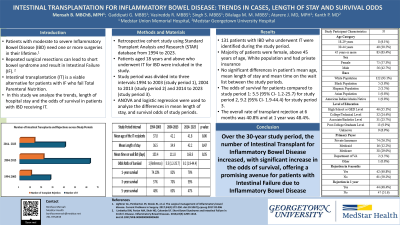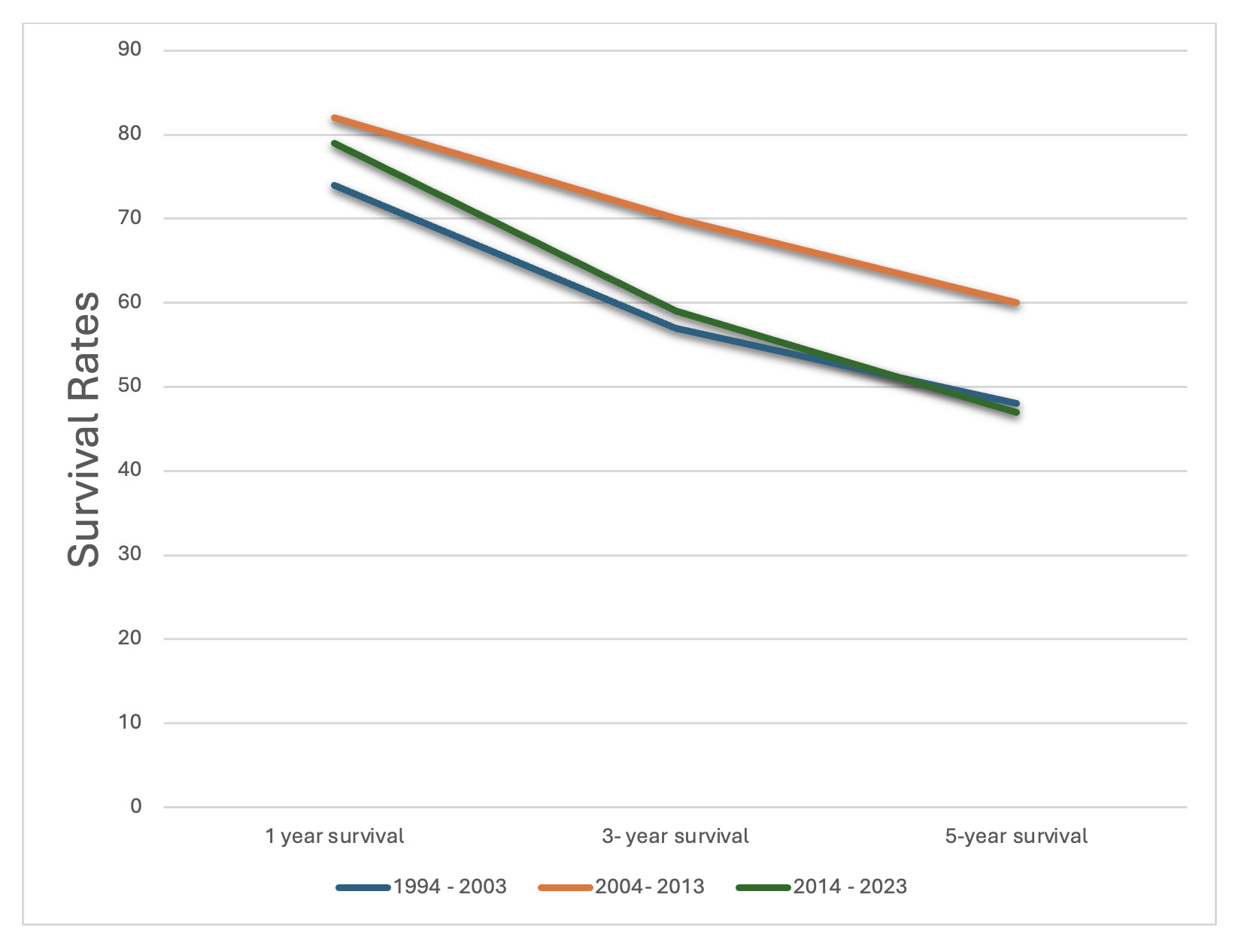Sunday Poster Session
Category: IBD
P0905 - Intestinal Transplantation for Inflammatory Bowel Disease: Trends in Cases, Length of Stay, and Survival Odds
Sunday, October 27, 2024
3:30 PM - 7:00 PM ET
Location: Exhibit Hall E

Has Audio
.jpg)
Boniface Mensah, MBChB, MPH
MedStar Union Memorial Hospital
Baltimore, MD
Presenting Author(s)
Boniface Mensah, MBChB, MPH1, Greeshma N Gaddipati, MBBS1, Ramya Vasireddy, MBBS1, Joseph Atarere, MD, MPH1, Mariah Malak Bilalaga, MBBS1, Simardeep Singh, MBBS1, Priyanka Kanth, MD2
1MedStar Union Memorial Hospital, Baltimore, MD; 2MedStar Georgetown University Hospital, Washington, DC
Introduction: Patients with moderate to severe Inflammatory Bowel Disease (IBD) need one or more surgeries during their lifetime. Repeated resections eventually lead to short bowel syndrome and can result in Intestinal Failure (IF). Current guidelines recommend Total Parenteral Nutrition (TPN) for patients with IF, however in selected patients and in patients who fail TPN, intestinal transplantation (IT) is becoming a viable alternative. In this study we analyze the trends, length of hospital stay and the odds of survival in patients with IBD receiving IT.
Methods: We performed a cross- sectional study using Standard Transplant Analysis and Research (STAR) database from years 1994 to 2023. STAR is the largest database in the United States containing all data on transplantation rates, outcomes, waiting lists, organ donation and matching. Patients above 18 years of age who underwent IT for IBD were included in the study. We divided the study period into three study intervals- 1994 to 2003 (study period 1), 2004 to 2013 (study period 2) and 2014 to 2023 (study period 3). ANOVA and logistic regression were used to analyze the mean length of stay, and survival odds.
Results: A total of 129 patients of IBD that underwent IT were identified during the study period of 30 years. Of these, 57.3% were female, 63.4% were above 45 years of age, and 93.1% White population. Private insurance was the highest payer for these patients (56.5%). The mean age of the patients undergoing IT was 46.6 ± 9.8 years and the mean length of hospital stay was 37.4 ± 28.8 days. The number of IT performed in patients with IBD increased from the first to second study period and plateaued thereafter. There was no significant difference in the mean age of the patients (37.8 vs. 42.1 vs 41.8 years, p=0.06), mean length of stay (36.5 vs 34.9 vs 42.2 days, p=0.47) and mean time on the wait list (103.4 vs 111.8 vs 116.8 days, p= 0.35) between the study periods. The odds of survival for patients in the study period 3 was 9.23 times that of the odds for patients in the study period 1 (95% CI- 1.92-44.44) and that of the patients in study period 2 was 5.52 times that of the patients in study period 1 (95% CI- 1.18-25.72). The rate of transplant rejection at 6 months was 40.8% and at 1 year was 48.4%.
Discussion: Over the 30-year study period, the number of IT for IBD increased, with significant increase in the odds of survival, offering a promising avenue for patients with IF due to IBD.

Note: The table for this abstract can be viewed in the ePoster Gallery section of the ACG 2024 ePoster Site or in The American Journal of Gastroenterology's abstract supplement issue, both of which will be available starting October 27, 2024.
Disclosures:
Boniface Mensah, MBChB, MPH1, Greeshma N Gaddipati, MBBS1, Ramya Vasireddy, MBBS1, Joseph Atarere, MD, MPH1, Mariah Malak Bilalaga, MBBS1, Simardeep Singh, MBBS1, Priyanka Kanth, MD2. P0905 - Intestinal Transplantation for Inflammatory Bowel Disease: Trends in Cases, Length of Stay, and Survival Odds, ACG 2024 Annual Scientific Meeting Abstracts. Philadelphia, PA: American College of Gastroenterology.
1MedStar Union Memorial Hospital, Baltimore, MD; 2MedStar Georgetown University Hospital, Washington, DC
Introduction: Patients with moderate to severe Inflammatory Bowel Disease (IBD) need one or more surgeries during their lifetime. Repeated resections eventually lead to short bowel syndrome and can result in Intestinal Failure (IF). Current guidelines recommend Total Parenteral Nutrition (TPN) for patients with IF, however in selected patients and in patients who fail TPN, intestinal transplantation (IT) is becoming a viable alternative. In this study we analyze the trends, length of hospital stay and the odds of survival in patients with IBD receiving IT.
Methods: We performed a cross- sectional study using Standard Transplant Analysis and Research (STAR) database from years 1994 to 2023. STAR is the largest database in the United States containing all data on transplantation rates, outcomes, waiting lists, organ donation and matching. Patients above 18 years of age who underwent IT for IBD were included in the study. We divided the study period into three study intervals- 1994 to 2003 (study period 1), 2004 to 2013 (study period 2) and 2014 to 2023 (study period 3). ANOVA and logistic regression were used to analyze the mean length of stay, and survival odds.
Results: A total of 129 patients of IBD that underwent IT were identified during the study period of 30 years. Of these, 57.3% were female, 63.4% were above 45 years of age, and 93.1% White population. Private insurance was the highest payer for these patients (56.5%). The mean age of the patients undergoing IT was 46.6 ± 9.8 years and the mean length of hospital stay was 37.4 ± 28.8 days. The number of IT performed in patients with IBD increased from the first to second study period and plateaued thereafter. There was no significant difference in the mean age of the patients (37.8 vs. 42.1 vs 41.8 years, p=0.06), mean length of stay (36.5 vs 34.9 vs 42.2 days, p=0.47) and mean time on the wait list (103.4 vs 111.8 vs 116.8 days, p= 0.35) between the study periods. The odds of survival for patients in the study period 3 was 9.23 times that of the odds for patients in the study period 1 (95% CI- 1.92-44.44) and that of the patients in study period 2 was 5.52 times that of the patients in study period 1 (95% CI- 1.18-25.72). The rate of transplant rejection at 6 months was 40.8% and at 1 year was 48.4%.
Discussion: Over the 30-year study period, the number of IT for IBD increased, with significant increase in the odds of survival, offering a promising avenue for patients with IF due to IBD.

Figure: Survival rates at 1, 3 and 5 years among study participants per study period.
Note: The table for this abstract can be viewed in the ePoster Gallery section of the ACG 2024 ePoster Site or in The American Journal of Gastroenterology's abstract supplement issue, both of which will be available starting October 27, 2024.
Disclosures:
Boniface Mensah indicated no relevant financial relationships.
Greeshma N Gaddipati indicated no relevant financial relationships.
Ramya Vasireddy indicated no relevant financial relationships.
Joseph Atarere indicated no relevant financial relationships.
Mariah Malak Bilalaga indicated no relevant financial relationships.
Simardeep Singh indicated no relevant financial relationships.
Priyanka Kanth indicated no relevant financial relationships.
Boniface Mensah, MBChB, MPH1, Greeshma N Gaddipati, MBBS1, Ramya Vasireddy, MBBS1, Joseph Atarere, MD, MPH1, Mariah Malak Bilalaga, MBBS1, Simardeep Singh, MBBS1, Priyanka Kanth, MD2. P0905 - Intestinal Transplantation for Inflammatory Bowel Disease: Trends in Cases, Length of Stay, and Survival Odds, ACG 2024 Annual Scientific Meeting Abstracts. Philadelphia, PA: American College of Gastroenterology.
